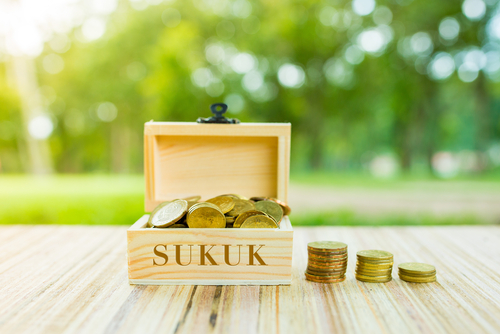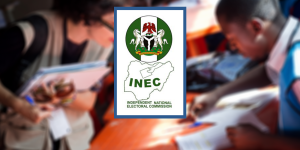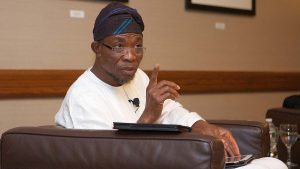OSUN SUKUK LOAN: ISSUES AND REPAYMENT

Based on agreement in 2013, on the 10th of October 2020, Osun State paid the final tranche of its ₦11.4 billion 7-year sukuk loan. In October 2013, the state sold the sukuk to over 40 domestic investors, a move which made the state the first issuer of a sharia-compliant bond in Nigeria, and the unlikely status of financial innovator. Let’s take a step back and see why this is important. The Sukuk High Schools are: Wole Soyinka High School, Ejigbo, Ataoja High School, Osogbo, Fakunle Unity High School, Osogbo, Oduduwa High School, Ile Ife, Ila High School, Ila-Orangun, Adventist High School, Ede, Iwo High School, Iwo, Akinorun High School, Ikirun, Osogbo High School, Ilesa High School and Ayedaade High School, Ikire.
Former Governor of the State of Osun, Ogbeni Rauf Aregbesola has been applauded for his use of Sukuk Bond by the Managing Director, United Insurance, Sudan,Dr. Tarig Khalil, Professor Ziyaad Mahomed of IFISA, Mounir Aliya from Saudi Arabia and Dr Umar Abdul Mutallab who expressed their satisfaction at the African International Conference on Islamic Finance, in Abuja. At the event, Dr. Umar Abdul Mutallab who described Aregbesola as fairless, transparent and prudent in financial resources said
“Aregbesola embraced SUKUK when many States and Countries lack the deep understanding of what SUKUK really stands for and utilise the opportunity judiciously. State of Osun under the administration of Rauf Aregbesola has become a reference points to states and Countries ín West Africa which the Federal Government of Nigeria has just key into recently with One hundred billion naira SUKUK bond”.
Former Governor Aregbesola only took sukuk bond to build 11 High Schools. For details of Osun State Sukuk projects go to www.raufaregbesolasukukcentre.
The Sukuk is a relatively cheap finance source as both lender and borrowers are said to be stakeholders and are risk bearers are repayment of principal and rental income are dependent on the success of the ventures such funds are invested in. The Sukuk is a bond issued basically as a long term loan product and with intention of facilitating specific projects which are solely developmental and tangible proceeds of which is expected to repay with rental income which In this case are biennial at the fixed rate.
The controversy is not really about Sukuk itself but political issue, an alternative financing package popular in Muslim countries for their interest-free benefits. In Osun State the plan to take Sukuk bond which generated enormous heat because of politics. When the debt is paid, sukuk remains a political issue in Osun.
Sukuk bonds are some of the innovative products offered by Islamic financial institutions. They are issued via certificates, with each sakk representing a proportion of undivided ownership rights in a tangible right or a pool of predominantly tangible assets or business venture(s). Conversely, conventional bond holders have no ownership shares in the asset, project or joint venture which the bonds support. Thus, perhaps the easiest way to understand a Sukuk bond, is by drawing distinctions between its features, and those of conventional bonds. While a conventional bond is proof of a debt, a Sukuk bond is proof of ownership in a specific project or investment activity – in accordance with Sharia rules and principles. Thus, while Sukuk holders receive a share of the profit from the underlying asset, bond holders receive fixed income for the life of the bond, and their principal is also guaranteed to be returned upon the maturity of the bond.
When an investor buys a sukuk they essentially purchase ownership in an asset that then means they are entitled to periodic cash flows by virtue of their claim of ownership. This means that a sukuk must be backed by an underlying income-generating asset. In Osun’s case, the proceeds from the sukuk were ultimately used to build ten schools—three in Osogbo, and one each in Ila, Ikurun, Iwo, Ilesa, Ife, Ikire, and Ejigbo—so the underlying income-generating assets were the schools. In particular, the Osun sukuk was structured in this way: the state government set up a Special Purpose Vehicle (SPV) called the Osun State Sukuk Company which owned the schools and sold individual rights of ownership to the sukuk holders.
The insinuation that Osun school would be taken over by “money lenders” is laughable in the sense that Sukuk is under the Osun Sukuk PLC, which is a company established by the Government of Osun. How then can an Osun company take over the schools built with proceeds of the bond? “The advert in question shows how our rating is stable with explanation that though there is dwindling oil prices but Osun is stable at B rating. “The schools are owned by Osun Sukuk plc, which is owned by Osun govt. How can a publication of the rating of govt and its spv become an issue to misinform the people and cause anxieties? “We should be proud of this credit rating. Nigeria was downgraded from bb so also all the states as a result of dwindling price of oil. Osun published these ratings out of its own volition and for transparency. Should there be anything threatening our assets would this be something to celebrate? “We heartily congratulate the critics for once again demonstrating their total ignorance.
And former Governor Aregbesola is also being accused of “introducing Sukuk to the average Osun citizens who did not know about Sukuk before”. Does that not further confirm that Aregbesola thinks out of the box in the efforts to bail Osun out of the shackles of poverty by seeking to bring home and to his people what is now the most embraced public infrastructure financing strategy across the world?’ ‘’That a company is taking over Osun Schools is just laughable. ’
Has Sukuk been issued in Nigeria?
A Sub-national Sukuk worth about $62 million (N11.4 billion) was issued by Osun state in 2013 and a Sovereign Sukuk valued $277.93 (N100 billion) in 2017 by federal government.
What are the growth potentials of the Nigerian Sukuk Market?
With population of about 200 million and a significant Muslim population estimated at over 50%, Nigeria is home to far more Muslims than all the leading Sukuk markets of Malaysia, Saudi Arabia, UAE, Kuwait and Qatar put together. In addition, Nigeria, estimated as the largest economy in Africa with a Gross Domestic Product of about $510 billion, has a larger economy than them, with the exception of Saudi Arabia.
By
Inwalomhe Donald writes from Osogbo, Osun State
![]()



